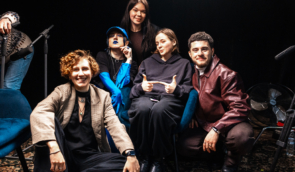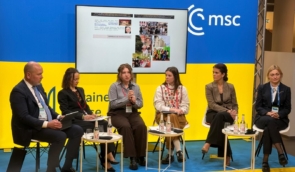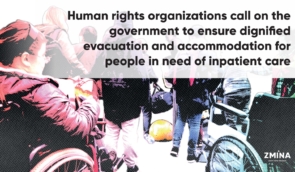Ukrainian human rights defenders raised the crime of the persecution of Ukrainian civilians in the occupied territories at the OSCE
On April 22, ZMINA in cooperation with Media Initiative for Human Rights, Ukrainian Legal Advisory Group, Crimea SOS, World Organization Against Torture (OMCT) and with support of the Mission of Ireland to OSCE and Human Rights House Foundation held the OSCE Supplementary Human Dimension Meeting I side event on the topic “Persecution of Ukrainian Civilians in the Occupied Territories as Crime Against Humanity: Civil Society’s Efforts in Restoring Justice”.
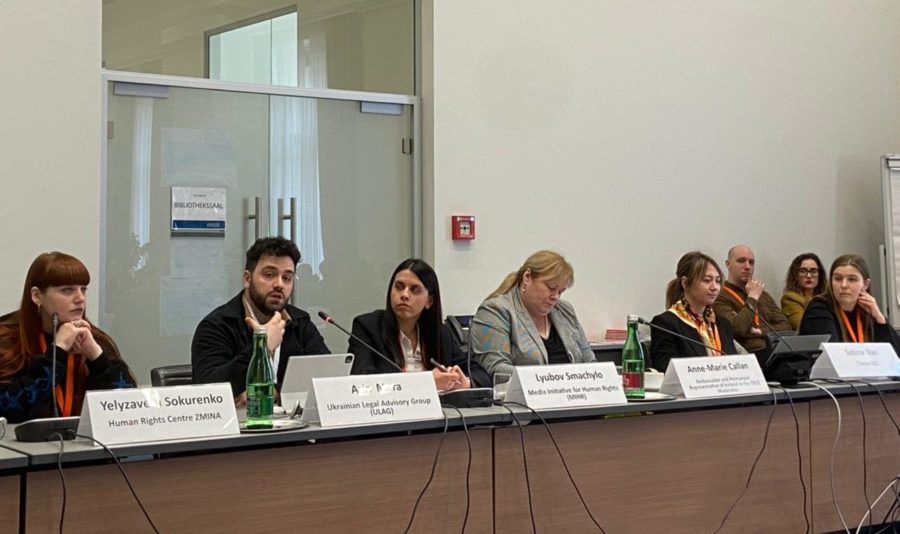 Photo credits: ZMINA
Photo credits: ZMINAThe event was moderated by the Ambassador and Permanent Representative of Ireland to the OSCE Ms Anne-Marie Callan and gathered around 60 diplomats, OSCE representatives and civil society actors from around the globe. Experts discussed the main patterns and trends of documented crimes, widespread practices of enforced disappearances and arbitrary detention, civil society’s work on the ground and its role in ensuring justice. They also issued recommendations to the OSCE and participating states.
“The practice of persecution of civilians continues in those regions of Ukraine that are still occupied. The Russian occupation administration continues to apply the so-called “filtering” procedures and tries to single out those civilians who may “pose a threat to occupation” or be perceived as “disloyal to the Russian Federation”. Every month we document new cases of arbitrary detention and enforced disappearance, as well as information about torture and deaths in detention facilities controlled by Russia. Since Russia applies its legislation in the occupied territories of Ukraine, we also document broad violations of the right to a fair trial. Dozens of civilians are being prosecuted under charges of committing “terrorism”, “espionage”, and “extremism”,” said Zmina’s Head of the War Crimes Documentation Department Yelyzaveta Sokurenko.
She touched upon the organisation’s efforts aimed at the documentation and analysis of international crimes committed by Russia in the occupied territories of Ukraine, in particular, arbitrary detention, torture, and enforced disappearance of civilians. According to ZMINA’s analysis, these crimes have signs of systematicity and are an element of the global policy of committing terror against the civilian population aimed to suppress any resistance and strengthen the occupation regime. The leading role in this process is played by the network of places of illegal detention and torture, spread throughout the territory controlled by the Russian Federation and in Russia itself.
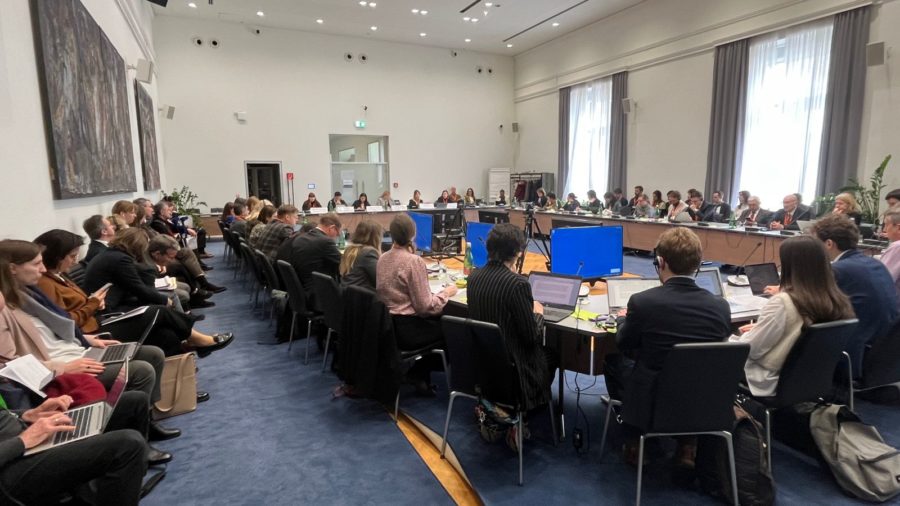 Photo credits: Crimea SOS
Photo credits: Crimea SOSSokurenko shared the story of Iryna Horobtsova, a volunteer and civil activist from Kherson who was detained in 2022 as a participant in pro-Ukrainian rallies. All this time, the woman was detained without any charges, incommunicado, without access to a lawyer, and in inhumane conditions. Now, she is accused of “espionage”. Another Ukrainian volunteer Marharyta Kharenko from Melitopol, Zaporizhzhya region was sentenced this month by Russian occupation authorities to 20 years in prison on charges of “extremism and terrorism”.
“Based on the testimony of illegally detained persons, who were released, and collected data, we know what is behind these so-called trials: detention without any legal grounds, in deliberately established and maintained inhumane conditions, constant degrading treatment, physical and psychological abuse, no access to medical care or lawyer, forced to sign or record self-incriminating confessions on video and other severe violations,” emphasized Sokurenko.
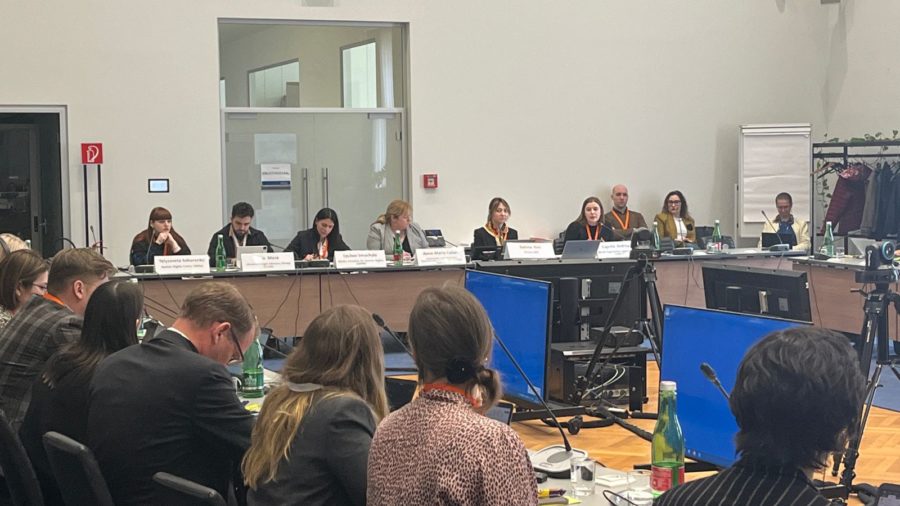 Photo credits: Crimea SOS
Photo credits: Crimea SOSMedia Initiative’s for Human Rights Analyst Lyubov Smachylo specified that the organization has currently identified 1,600 people who are held in Russian detention. However, there is every reason to believe that this number is much higher. In addition, families who are waiting for the release of their loved ones are also victims of crimes.
Eugenia Andreyuk, Regional Programme Coordinator of the World Organisation Against Torture (OMCT) noted: “Russians practice a systematic and widespread policy of persecution of civil society in the occupied territories which may amount to crimes against humanity.” She explained that the actual plan can be seen in their actions: firstly, Russians arbitrarily detain or abduct a person and put him/her in an official or unofficial detention place, then they torture a victim as a method of punishment or forcible inclination to cooperation, afterwards, a person might either be released if not seen as a threat anymore / in case of being severely injured, or illegally transferred to the temporarily occupied “DPR”, “LNR” or territory of Russia or Belarus.
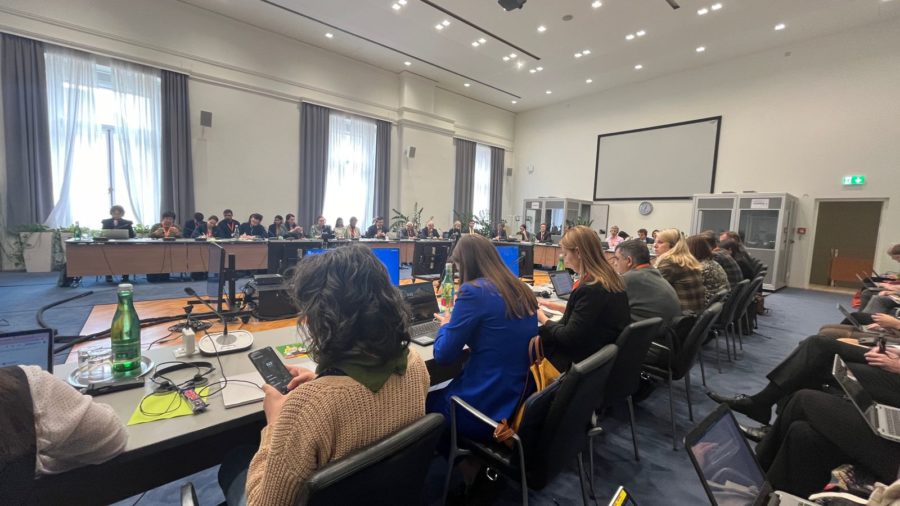 Photo credits: Crimea SOS
Photo credits: Crimea SOSCo-coordinator of the Crimea SOS Sabina Ilias dragged the attention of participants to the fact that the crime of persecution of civilians began in 2014 and has been also documented in the temporarily occupied Crimea. She mentioned the case of Reshat Ametov — a Crimean Tatar activist who went on a single picket against the occupation in 2014, was abducted and, later, found dead with traces of torture on his body. Ilias also emphasized that currently, there are over 200 Crimean political prisoners. Lawyers who support them are also being persecuted, for example, Emil Kurbedinov.
Finally, Arie Mora, Communications and Advocacy Manager of the Ukrainian Legal Advisory Group, spoke about the ways of prosecuting perpetrators: “There are multiple justice avenues and, at the same time, no concrete ones.” He highlighted challenges on the domestic level: the non-existence of a crime against humanity in Ukrainian legislation, no command responsibility, no practice of investigating crimes comprehensively and with a systematic approach, and the need to improve victims’ and witnesses’ protection in a court.
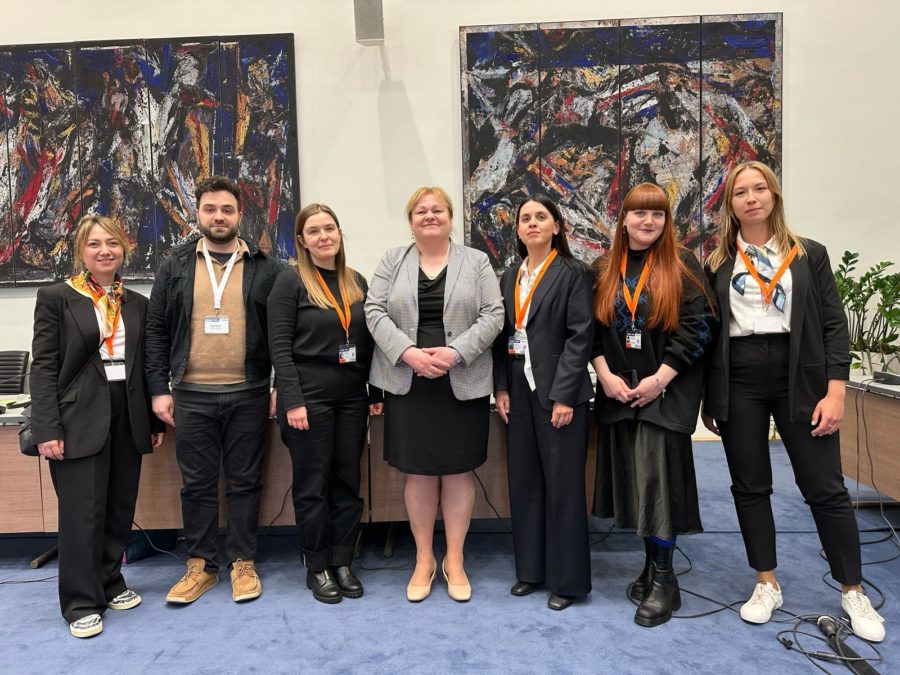 Ukrainian and international civil society representatives with the Ambassador of Ireland to the OSCE Ms Anne-Marie Callan
Ukrainian and international civil society representatives with the Ambassador of Ireland to the OSCE Ms Anne-Marie Callan“In documenting international crimes, we strive for two goals: to bring the perpetrators to accountability and to achieve justice for the survivors. The help of the international community in this is crucial,” added Yelyzaveta Sokurenko.
Experts welcomed the invoking of the Moscow Mechanism and called to ensure the implementation of its recommendations, as well as to make statements about civil society representatives illegally deprived of liberty as a result of Russian aggression against Ukraine, to speak up their names, to make requests about their whereabouts and health conditions, to seek an opportunity to visit court hearings in Russia on their cases and to call for their release.
Using this opportunity, Ukrainian human rights defenders also met with Maltese, Canadian and Norwegian Missions to the OSCE and raised topics of international crimes’ documentation and ensuring justice.
If you have found a spelling error, please, notify us by selecting that text and pressing Ctrl+Enter.

